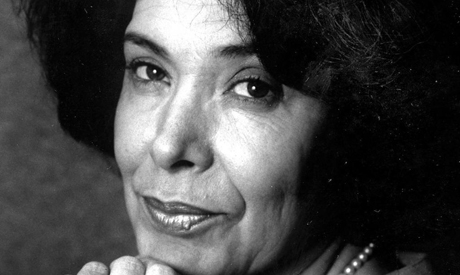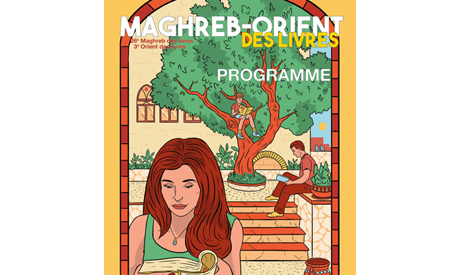Continuing a tradition going back some quarter of a century, the Maghreb des Livres book fair took place in Paris last weekend, with organisers Coup de Soleil and IReMMO, the Institut de Recherche et d’Études Méditerranée Moyen-Orient, once again joining forces to bring together some 150 French and North African authors for three days of debates, conferences, book signings and book buying on broadly North African themes in the 19th-century grandeur of the Paris City Hall.
Designed as an opportunity for the francophone public to keep up to date on recent publications in French on especially the North African countries of Morocco, Algeria and Tunisia, all of them former French colonies or protectorates and all using French as well as Arabic as national languages, the Maghreb des Livres fair has in recent years set its sights wider still with the incorporation of the IReMMO’s Orient des Livres fair in 2018. The latter, now on its third edition, has thus joined forces with the former, now on its 26th, to produce what has become a fixture of the Paris cultural calendar and perhaps the only event of its kind in Europe.
In addition to the City Hall’s rather overblown 19th-century reception spaces, reached by flights of marble stairs that would not look out of place in a certain type of Hollywood film, the book fair this year also pressed basement conference and committee rooms into service, their usual battles over municipal spending being put on hold and replaced by debates on the legacies of French colonialism in the Arab world, North African writers, and the “fractures of the [French] republic,” among other subjects. Some of those speaking had been brought in to introduce their books, often on sale on the City Hall’s upper floors, while others were appearing because of their recognised expertise.
Algerian academic Afifa Bererhi spoke interestingly about the Algerian legacy of the late Algerian francophone author Assia Djebbar, for example, the first North African woman to be elected to the prestigious Académie française, from the point of view of someone who had worked with Djebbar and shared her struggle for the rights of Algerian women. This was on a panel presentation marking the fifth anniversary of Djebbar’s death in 2015 that also took in talks commemorating the pioneering Algerian francophone author Mohammad Dib, perhaps best known for his novels La Grande Maison and Le Metier à tisser, both published in the early 1950s at the start of a more than half century career.
Algerian academic Naget Khaddar spoke on Dib’s reception in Algeria today, while his daughter Catherine Dib explained events planned to commemorate the centenary of his birth later this year. Dib was born in July 1920 in Tlemcen in then French Algeria.
According to Georges Morin and Jean-Paul Chagnollaud, presidents of Coup de Soleil and IReMMO, respectively, writing in the programme for this year’s Maghreb des Livres, the event aims to “encourage exchanges of views on the questions haunting the difficult and chaotic world in which we live today.” These include the current uprisings seen in certain countries across the Arab world, notably Algeria, the “risks of fracture” experienced in France today, and the return to the common history that links together the north and south of the Mediterranean and that can “help us to understand present circumstances.”

Djabbar
Many of the discussions attended by Al-Ahram Weekly at this year’s fair, unfortunately not as many as might have been wished because of parallel programming, were threaded through with this kind of contemporary urgency and not only because the books on sale reflected the most recent harvest of titles on the Maghreb and French relations with North Africa and the rest of the Arab world.
Perhaps the tone was set by an introductory talk by Algerian francophone author Kamel Daoud, best known for his rewriting, from an Algerian and post-colonial perspective, of French Algerian author Albert Camus’s novel L’Etranger (The Outsider), like many of Camus’s novels set in the author’s native colonial-period Algeria. Daoud produced a retelling of this famous story in his Meursault, contre-enquête, translated as The Mersault Investigation, in 2013.
At the Maghreb des Livres fair he spoke on “what to do with the former coloniser”, an urgent question, he said, if we wanted to see a “real liberation” of the Arab world from the memory of foreign control. Whatever the answer to this question might be — a demand for reparation, a desire to forget, or a wish to prioritise present friendships over past enmities — there was a need to avoid the “reactivation of the past in the present”, Daoud said, if there was to be an escape from an eternal “playing out of roles”.
PAST TO PRESENT: Daoud’s reflections, abstract in character, provided the background for subsequent discussions on the presence of the past in the present that were more concrete in tone.
A panel discussion featured French writers and academics Jacques Frémeaux, Michèle Perret, Françoise Gallo, and Sylvie Thénault discussing their recent books on colonial-period Algeria. Discussing his book Algérie 1830-1914, naissance et destin d’une colonie, Frémeaux said that his intention had been to place Algeria within the 19th-century French colonial system as “a colony, a barracks, and a projection of French power across the Mediterranean.”
In her novel Le premier convoi 1848, author Michèle Perret said that she had tried to reconstruct the mental world of some of the first settlers to be sent to Algeria in 1848 after the crushing of the 1848 Revolution in France. These people, victims of army violence in France itself and fleeing counter-revolution in the country, had nevertheless found themselves on the side of French militarism in Algeria. Reconstructing a different story, this time individual rather than collective, author Françoise Gallo explained the thinking behind her novel La Fortuna, which described the life of an abandoned child taken in by nuns in Sicily who subsequently joined the first waves of European colonialism in Tunisia.
History of a different sort was examined by panelists brought in to speak on the anniversaries of the death of Djebbar and the birth of Dib, pre-eminent novelists of colonial and post-colonial Algeria. For Berkerki, the “dark side of Djebbar” for French audiences lay in her initial vocation as a historian rather than a novelist and the research she had carried out in order to explain “Algerian women’s silence.” Too often, Djebbar was still seen in relation to the French feminism of the 1950s when she had begun her career with the early novel La Soif, described as a kind of Algerian version of French novelist Françoise Sagan’s celebrated 1950s novel Bonjour tristesse, in the wake of pioneering feminist work by French authors Simone de Beauvoir and Marguerite Duras.
Yet, Djebbar had always been at least as interested in Arab feminism and Arab history, despite her writing in French, Berkerki insisted. She had translated a novel by Egyptian novelist and activist Nawal Al-Saadawi into French, for example, and she had sought in her “lost works” (to French audiences) to connect her historical investigations to her descriptions of contemporary circumstances.
Bringing the debates up to the present, a further panel, this time on “the fractures of the [French] republic,” saw authors Akli Tadjer, Antoine Menusier, Ismail Ferhat, Jean-Pierre Luizard, and Saber Mansouri discuss their recent books on debates taking place in France today relating to the legacies of French colonial rule in the Maghreb and the development of France’s multicultural society.
Some of those present at the fair’s final sessions may well have felt a need to soldier on as the clock marched past seven in the evening. However, they also must have felt glad they had, as Akli Tadjer spoke interestingly of his book Qui n’est pas raciste ici? (Who isn’t racist here?), recounting his experiences in lesser-known parts of France, and Antoine Menusier meditated on the various meanings of exclusion discussed in his Livre des indésirés, an overview of integration.
Ismail Ferhat described his edited book Les foulards de la discord, an examination by different hands of the controversy that broke out in the Paris suburb of Creil when some young women of North African origin arrived at school wearing headscarves in 1989 in a premonition of further controversies to come, while Saber Mansouri described his book La France est à refaire, histoire d’une renaissance qui vient (Remaking France – a Coming Renaissance) as looking particularly at discourses of belonging.

The fair’s poster
One of the strengths of the Maghreb des Livres is its mixing of registers and personalities, with academics presenting their research on panels that also include novelists discussing their works and essayists presenting their reflections. School delegations arrived at intervals from secondary schools in the Paris area to engage in dialogue with various authors. As has also been the case at previous editions of the fair, the emphasis was on French publications and French authors, though there was also representation from the Maghreb countries.
Books published by Elyzad, Nirvana and Arabesques in Tunisia were in evidence, along with books from Barzakh, Chihab, and other small-scale publishers in Algeria. The automatic circulation of books across the Mediterranean, easier than it used to be, may still be a work in progress, as may lasting collaboration between European and North African publishers. However, it can only benefit from events such as last weekend’s Maghreb des Livres book fair in Paris.
*A version of this article appears in print in the 13 February, 2020 edition of Al-Ahram Weekly.
Short link: